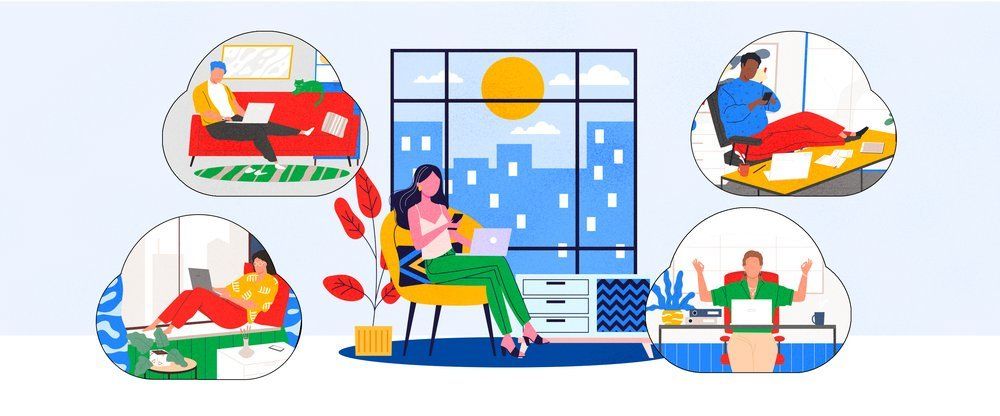Twelve Easy Ways to Protect Your Online Privacy
 Many people think the Internet is full of boogeymen waiting to jump them after every click. I think this is why so many users have trouble with computers. They don’t trust them. They’re convinced that one mis-click will end Social Security, start a war with Brazil, and all things chocolate will turn into vanilla.
Many people think the Internet is full of boogeymen waiting to jump them after every click. I think this is why so many users have trouble with computers. They don’t trust them. They’re convinced that one mis-click will end Social Security, start a war with Brazil, and all things chocolate will turn into vanilla.
There’s a widely-held belief that computers have this much power.
The truth is, the Internet isn’t all that bad. It’s actually the user that has all the power. Part of the perceived problem is caused by common sense (or the suspension of). Something happens where a user’s inhibitions go out the window while they’re online. It’s like their mouse is injecting tequila into their bloodstream, and after a while — WOOHOO!!! Anything goes! I’ll tell anyone anything!
The other part of the perceived problem is complacency. If you’re in your pajamas, in your office, or better yet — in your pajamas while in your office, you feel safe and secluded. Nothing can reach you there. You start getting lazy about update notices, stop reading things through before clicking on them…and then BAM! You’re nailed.
Vigilance is the key. There is no vacation from following safe practices. Just follow these twelve steps and keep yourself out of trouble:
1. Use WORKING Antivirus Software
I hear the following daily: “I have Antivirus software! Look — it came with the computer!” Yeah, and it expired 2 years ago, meaning it’s protecting you from threats that came out two years ago. The prevalence of rogue antivirus junkware and exploits that take but a single click to execute means if you’re not protected, you’re playing with fire. This warning gets beaten to death, but our service desk gets a lot of computers every week from people that think they’re immune from the dangers of the world. We have free antivirus software on our Software page (free for anyone!), so if you need protection, you have no excuse.
2. They Make Updates for a Reason

“Groooooaaannn… more updates???” I know… it can be a hassle when you see that notification appear on the taskbar. There’s a lot of utilities running on your computer, and they all have to play nice with each other to work correctly with Windows. Sometimes, in order for a utility to work correctly, there must be a small security compromise made — intentionally or unintentionally. There’s also a huge group of hackers out there looking for these compromises so they can get access to your computer and start messing up the place. Updates are fixing security flaws before someone can take advantage of them, and hackers hope that you’re to lazy to get them installed. When updates show up on your computer, get them installed ASAP.
3. Use the Latest Web Browser
New versions of web browsers are released to:
a) Introduce new, convenient features
b) Increase performance
c) Correct flaws that create security risks
d) All of the above
e) None of the above
If you answered “d”, you are correct. If you answered “e”, you are probably still running Internet Explorer 3 and can’t read this page, so I don’t understand how you answered. If you answered “w” I no longer wish to speak with you.
Anyway, new versions of Internet Explorer, Chrome, and Firefox are released from time to time. They’re not released to annoy us with long, unnecessary download times as many think. They’re made available for our benefit and safety. Make sure you take advantage of them. Chrome and Firefox users are at a bit of an advantage in this area, as their browsers update automatically. You just open your browser one day and it prompts “Restart: we install a new version.” Internet Explorer users have to go through Windows Update for the latest version.
4. Use Better Passwords
I can’t stress this enough. If your password is something easy — like your name, your pet’s name, your phone number, your address…then it’s going to be easy for someone else to guess it. Worse yet, there’s even software designed to crack easy passwords — often within minutes. Make your passwords as least 8 characters long, and mix it up! Add some capital letters, numbers, and even some punctuation marks in there. Simple things like this make your password crack-proof AND guess-proof.

5. Secure Your Wireless Connection
If you use a wireless modem or router, it should be password protected. If not, anyone can use your connection — which in itself isn’t so bad. Some people see it as neighborly. However, if they can use your connection, they can also see any shared folders on your computer. Photos, documents, music, movies, and even your keystrokes in some cases…all of these may be publicly available up to 1/4 mile away from your router. Your wireless connection should use at least WPA or WPA2 Security. If it’s off, check with your equipment documentation on how to activate its security features. Older wireless routers used WEP Security, which is completely inadequate (programs are freely available that can break WEP keys in 30 seconds). Consider upgrading if your equipment still uses WEP.
6. Watch Your Bank Accounts
I know — “What does my bank account have to do with the Internet?” A lot actually. If you use your credit card to buy things online, you’ll want to check your statements from time to time to make sure you’re the only one using your credit card to buy things online. Credit card thieves are getting sneakier, and often make “micro-charges” — or small charges that they hope you won’t notice. If you see charges that don’t look familiar…no matter how small…check them out.
7. Properly Dispose of Documents
A good number of identity thieves get steal their information from dumpster diving. Bills, financial statements, and other records often have account numbers that will give anyone access to online accounts. Make sure they’re shredded. If you don’t have access to a shredder, tearing into small pieces and disposing of the paper in separate garbage bins works well too. I go the extra mile and empty my cat’s litter box on top of the shredded paper. Seems to work well.
8. Online Checkout Needs HTTPS
Buying something online usually requires a credit card. Before you enter your card number, make sure the address of the site starts with https:. This signifies that the site is encrypted, and prying eyes can’t see your card number as you hunt and peck it in.
9. Don’t get hooked in phishing
Your bank will never email you asking to confirm your bank account numbers. Your ISP will never email you asking for your password. Your mom may email you asking why you haven’t called her in the last three weeks. The first two examples are things to which you should never reply. Phishing, or sending fake emails to try tricking you into sending personal information, is very common. Never email someone sensitive information without verification. If in doubt, contact the sender.
As for that last example, you can choose to ignore it, but I wouldn’t recommend it.
10. Consider a “Junk” Email Account
Nearly everything requires you to enter an email address these days. Warranties, contests, surveys, you name it. Many companies return your generosity by selling your address to marketing services. Once a marketing service gets it, it’s up for bids. Anyone from Nigerian pirates to Canadian mob bosses can send you spam. You can sign up for warranties and contests with more confidence by using a secondary “junk” email account. That way, you don’t get spammed to death in your main account, and you can check the junk account once in a while — knowing most of the stuff in there can be disregarded.

11. Social Networking Bleeds Your Info
Facebook is basically designed to share everything about you to everyone else. I’m sure you don’t want everyone else to know that you ate too much cheese at the Christmas party, are about 20lbs too heavy to be wearing the bikini in that photo, and what your relationship status is these days. Facebook has turned into the #1 data mine for scam artists. They just browse Facebook looking for open accounts, take down information, and go to town. Be sure to set the privacy controls to show your info to “Friends” only. For information on adjusting your Facebook privacy, check out Facebook’s Privacy page.
12. Don’t Tell Strangers Personal Info
Ever get a phone call during dinner saying “This is George from the Human Fund. We’d like to get some information on your habits. First we’ll need your full name, address, birth date, where you went to school…”. You really have no idea who these people are, and they can use this information to open online accounts, recover passwords, and lots of other evil stuff. If they are a legitimate company, they should be happy to mail you a form to fill out rather than taking down your life history over the phone.







